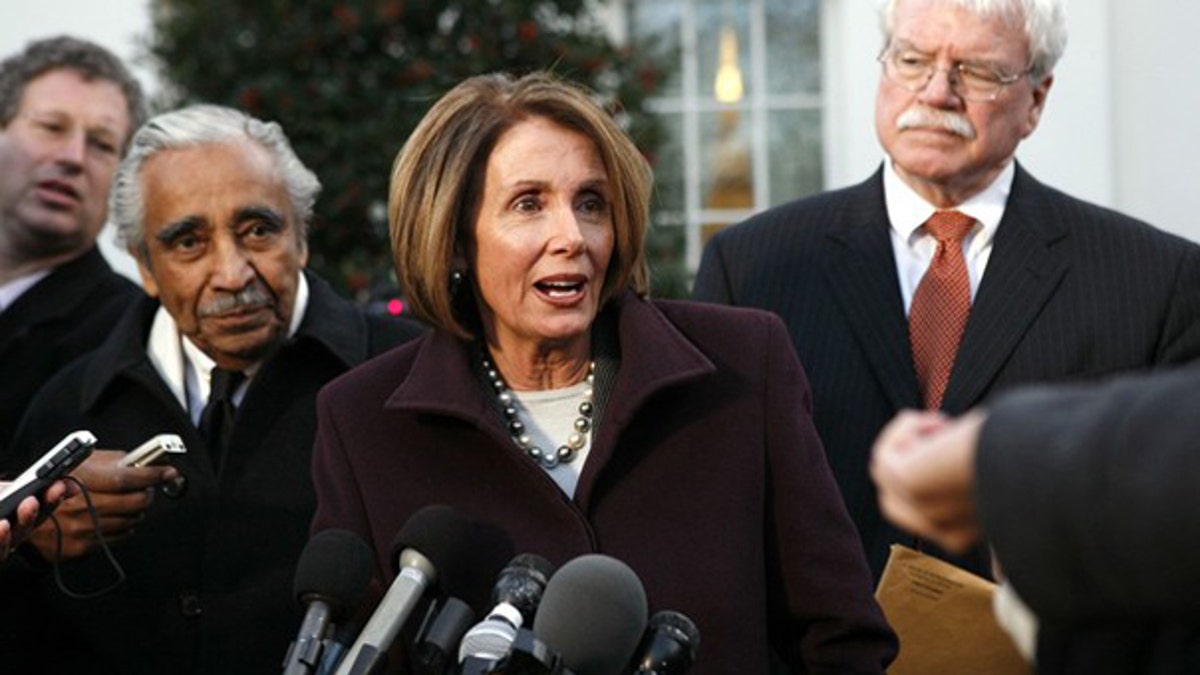
House Speaker Nancy Pelosi talks to reporters after a meeting with President Obama and House Democrats at the White House Jan. 6. (Reuters Photo)
This is the fourth part of a five-part series on health care reform. Watch "Special Report With Bret Baier" every day this week at 6 p.m. ET for the latest installment in the Health Care Countdown series.
The so-called public option, once hailed by Democrats as essential to health care reform, turns out to be truly optional.
With health care talks in the final stretch, leading congressional Democrats are signaling a willingness to let the controversial proposal for a government-run insurance plan die off. Though House Democrats in particular had been insistent on the program since the start of the health care debate, they concede now that they may have to part with it in order for the sweeping overhaul to pass the Senate a second time.
"It has become the incredible shrinking public option," said Jim Kessler, vice president for policy with Third Way.
The idea has gone through many variations before making its way to what may be the policy graveyard.
"The original hope among those on the left side of the progressive movement was to have a single-payer system," Kessler said.
The vision for such a European-style system quickly faded away, though, and its supporters leaned back on a government-run option that would serve as a competitor to the private insurance industry.
But the House even limited the reach of that proposal, restricting it to small businesses and individuals. The idea was to get a nonprofit plan that spent all the money it got in premiums on the people enrolled.
Ron Pollack, director of Families USA, explained that such a program would still give consumers a good deal because the government wouldn't have to worry about things like making a profit or advertising. Some hoped the public option would in turn force private insurance companies to lower their own rates.
Moderate Senate Democrats, though, were not persuaded. Since Senate Majority Leader Harry Reid needed every Senate Democrat on board to pass the bill, his version did not include the public option.
Kessler said the reason the plan ran into opposition was that it would not have been a less expensive, higher quality plan.
"Just like Medicare isn't a less expensive, higher quality plan - it's an adequate plan," he said.
And now, many House Democrats seem ready to throw it overboard.
As they work with President Obama and wrangle with Senate Democrats over the shape of the final product, House Speaker Nancy Pelosi seemed to talk about the government-run option in the past tense, saying the goals of the public option will be accomplished in other ways.
"We will have what we need to hold the insurance companies accountable," Pelosi said Tuesday. "I contend that whatever we have coming out of this bill will hold them accountable, and they'll be crying out for a public option one of these days."
Another member of the Democratic leadership, Rep. James Clyburn, D-S.C., recently conceded that he could support a bill without a public option.
Rep. Henry Cuellar, D-Texas, acknowledged what many House members have concluded.
"The big issues like, you know, public option ... (in) my perspective, I think we're going to go with the Senate version," he said.
Kessler said that new regulations on insurance companies ultimately made the public option less necessary. He said changes such as requiring the companies to cover pre-existing conditions "made private insurance more like what progressives had hoped a public option would be."
Fox News' Jim Angle contributed to this report.




